Intel SSD 730 (480GB) Review: Bringing Enterprise to the Consumers
by Kristian Vättö on February 27, 2014 12:00 PM EST- Posted in
- Storage
- SSDs
- Intel
- Intel SSD 730
Random Read/Write Speed
The four corners of SSD performance are as follows: random read, random write, sequential read and sequential write speed. Random accesses are generally small in size, while sequential accesses tend to be larger and thus we have the four Iometer tests we use in all of our reviews.
Our first test writes 4KB in a completely random pattern over an 8GB space of the drive to simulate the sort of random access that you'd see on an OS drive (even this is more stressful than a normal desktop user would see). I perform three concurrent IOs and run the test for 3 minutes. The results reported are in average MB/s over the entire time. We use both standard pseudo randomly generated data for each write as well as fully random data to show you both the maximum and minimum performance offered by SandForce based drives in these tests. The average performance of SF drives will likely be somewhere in between the two values for each drive you see in the graphs. For an understanding of why this matters, read our original SandForce article.
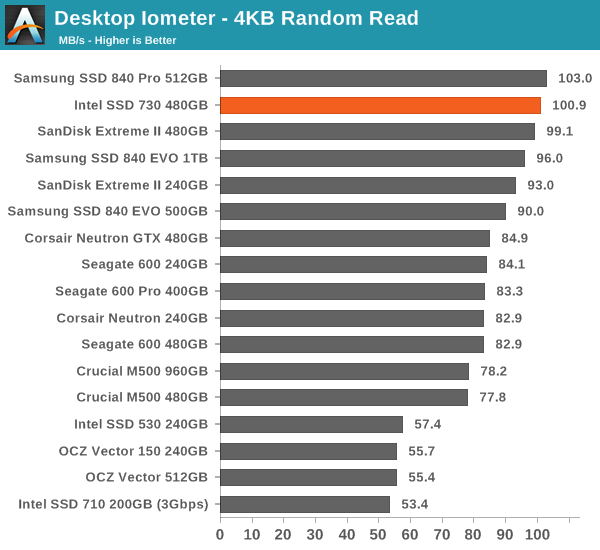
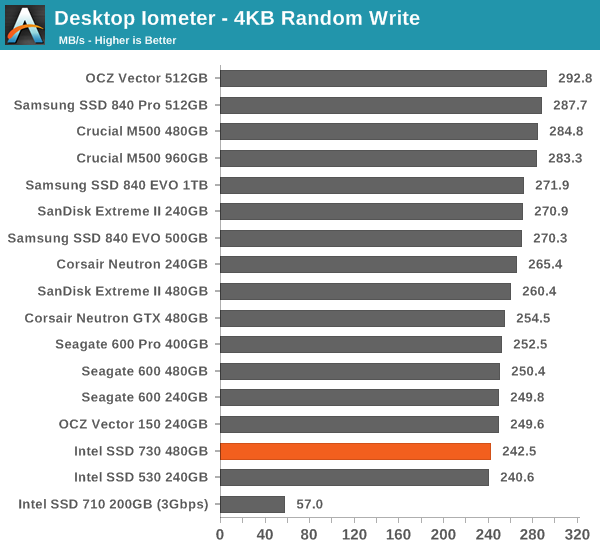
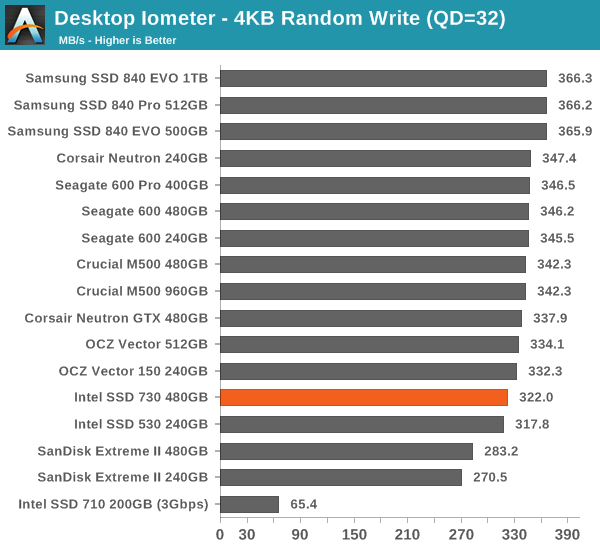
The SSD 730 isn't the fastest in peak performance because that's irrelevant in the enterprise space. We are still looking at decent random write performance and the random read performance is actually surprisingly good.
Sequential Read/Write Speed
To measure sequential performance I ran a 1 minute long 128KB sequential test over the entire span of the drive at a queue depth of 1. The results reported are in average MB/s over the entire test length.
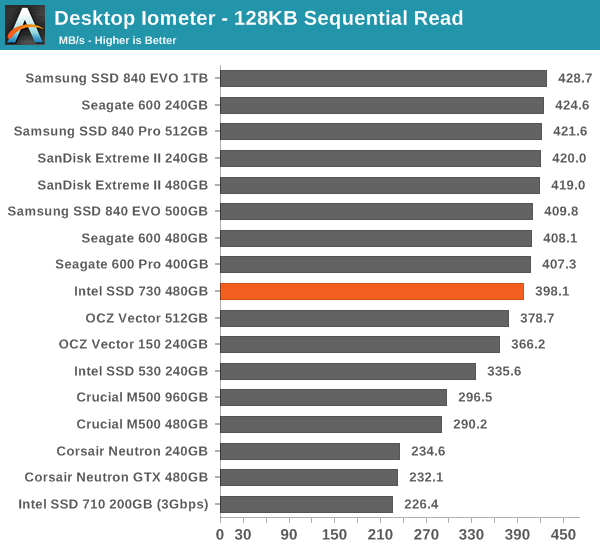
The same goes for sequential performance: the 730 is an average performer with focus on consistency.
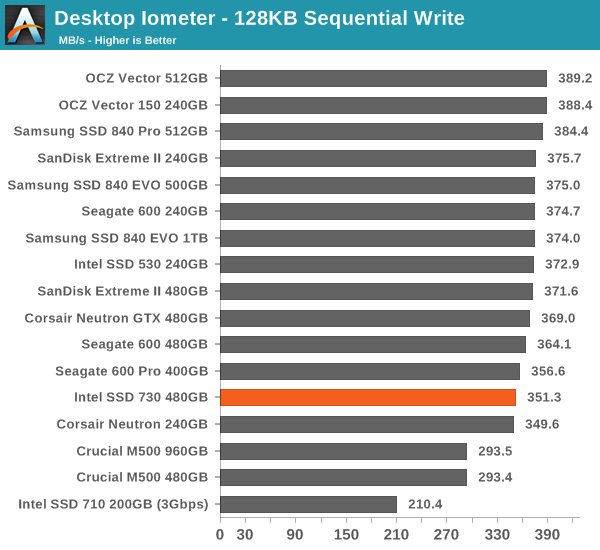
AS-SSD Incompressible Sequential Read/Write Performance
The AS-SSD sequential benchmark uses incompressible data for all of its transfers. The result is a pretty big reduction in sequential write speed on SandForce based controllers.
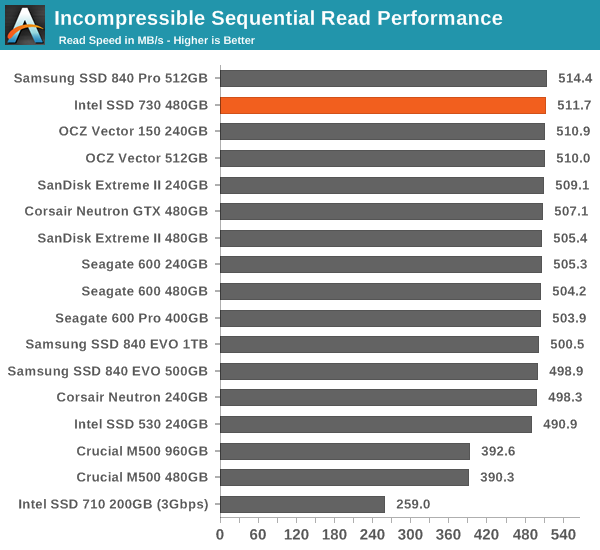
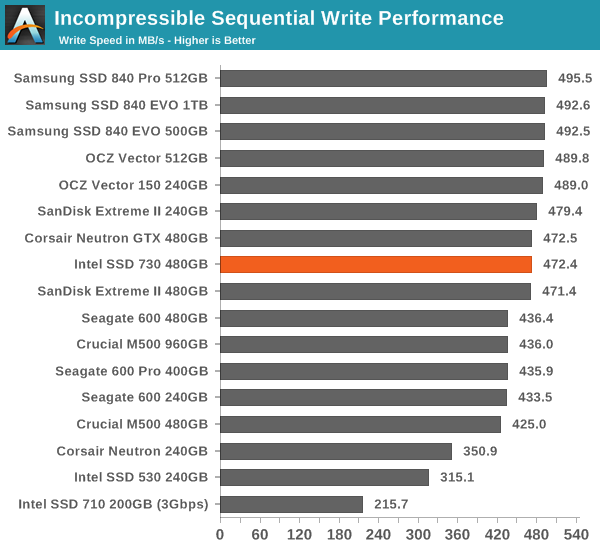










96 Comments
View All Comments
wpcoe - Monday, December 8, 2014 - link
I bought the 240GB version at Fry's last Thursday for US$98.00. I figure that at 40¢/GB how bad can it be.amddude10 - Thursday, November 27, 2014 - link
Why does Intel list this as not having "enhanced power loss protection" for either size of the drive? I found no mention of power loss protection on Intel's own product information listing for this. By contrast, the listings for the old 320, S3500, and S3700 show that they do have "enhanced power loss protection." This article states that the 730 has "similar" power loss protection to the S3700, so why isn't this listed on the intel product info page for the 730? This isn't another case of a company letting reviewers believe something other than what is the case, is it? Here's the link: http://ark.intel.com/products/81039/Intel-SSD-730-...mohaba - Friday, December 19, 2014 - link
I'm curious to know the same thing. Every review across the internet mentions that feature, as well as the lack of encryption support and using HET nand, yet the intel documentation is exactly the opposite. I see intel did a documentation update in december.Kob - Saturday, February 27, 2016 - link
The critical difference between the info provided in this current review and Intel's own specs athttp://ark.intel.com/products/81039/Intel-SSD-730-...
regarding enhanced power-loss protection and encryption support diminishes the the trust in Intel public information and reviews in generals.
See what Intel had to say on this in early 2015, and even after that they did not change their official specs as on 2/27/16. What gives?
http://www.hardwarecanucks.com/news/storage-news/r...
NvidiaWins - Saturday, June 20, 2015 - link
Intel is the only SSD manufacturer that didn't fail the stress test, every other SSD vendor FAILED miserably!! http://www.extremetech.com/computing/173887-ssd-st...I own 3 of the 520 series Cherryville 240GB's, 2 are almost 3 years old and still @100% life.
The Gambler - Wednesday, August 12, 2015 - link
Hmm. I did put my 730 into a laptop. But considering how power hungry my laptop is anyway, it pretty much stays plugged in all the time.I could use it on my other PC, but that's a 10-year old Dell Dimension that recently got an HDD upgrade for archival purposes. No use there really.